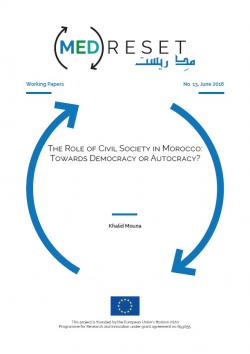The Role of Civil Society in Morocco: Towards Democracy or Autocracy?
The process of democratization in Morocco has confronted political and economic challenges. Civil society has recently become very active in Moroccan society, operating in all sectors and starting from the paradigm of human rights. However, this civil society faces two major difficulties. The first is intrinsic to its existence, because it lacks resources and professionalism; whereas the second difficulty lies in the nature of power and its centralization, as central power is obsessed by co-optation of political actors and actors from civil society. Thus political actors and social activists must start from consensus as a prerequisite and avoid anything that could challenge the political system. This leaves little room for a genuine democratic process. This is the context that the EU enters as an external player. How is it perceived by grassroots actors, and what role could it play to become a true partner towards democracy?
-
Details
Rome, IAI, June 2018, 22 p. -
In:
-
Issue
Working Paper 13
Introduction
Methodology
1. Political Stability and Human Rights
2. Can a State Be Democratic without Democracy?
3. The “Arab Spring” and Restricting the Political Sphere
4. Overview of EU–Morocco Relations
5. Comprehensive Analysis of Actors’ Perspectives
5.1 The Disparity of the Mediterranean
5.2 Political Model in the Region
5.3 The EU and Agents of Change
Conclusion
References
List of Interviewees



